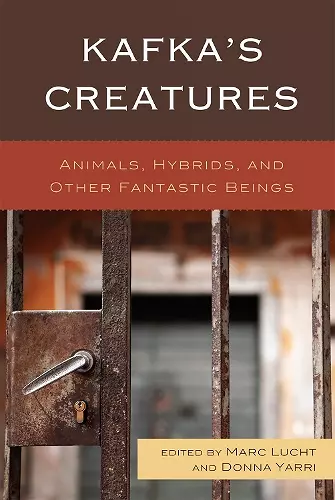Kafka's Creatures
Animals, Hybrids, and Other Fantastic Beings
Donna Yarri editor Marc Lucht editor
Format:Paperback
Publisher:Bloomsbury Publishing PLC
Published:3rd Apr '12
Currently unavailable, and unfortunately no date known when it will be back
This paperback is available in another edition too:
- Hardback£109.00(9780739143940)

There are few literary authors in whose work animals and other creatures play as prominent a role as they do in Franz Kafka's. Exploring multiple dimensions of Kafka's incorporation of nonhuman creatures into his writing, this volume is the first collection in English of essays devoted to illuminating this important and ubiquitous dimension of his work. The chapters here are written by an array of international scholars from various fields, and represent a diversity of interpretive approaches. In the course of exploring the roles played by nonhuman animals and other creatures in Kafka's writing, they help make sense of the literary and philosophical significance of his preoccupation with animals, and make clear that careful investigation of those creatures illuminates his core concerns: the nature of power; the inescapability of history and guilt; the dangers, promise, and strangeness of the alienation endemic to modern life; the human propensity for cruelty and oppression; the limits and conditions of humanity and the risks of dehumanization; the nature of authenticity; family life; Jewishness; and the nature of language and art. Thus the essays in this volume enrich our understanding of Kafka's work as a whole. Especially striking is the extent to which the articles collected here bring into focus the ways in which Kafka anticipated many of the recent developments in contemporary thinking about nonhuman animals.
Kafka's affinity and empathy for animals led him to write numerous tales in which the central characters are thinking animals, human-animal hybrids, or fantastic creatures. These tales have traditionally been interpreted allegorically, as fables that reduce the human condition to its basic, enigmatic features. Lucht (philosophy, Virginia Tech) and Yarri (theology, Alvernia Univ.) have gathered suggestive, insightful critical analyses (representing a diversity of approaches) that for the most part challenge this allegorical assumption about Kafka's creatures. In treating Kafka's animal stories more as stories about animals, the contributors not so much overthrow the time-honored allegory assumption but augment it by exploring Kafka's provocative blurring of the boundaries between species and creatures. At its best, the volume sheds light on Kafka's subversion of anthropocentric prejudices and sociocultural values, thus generating new perspectives on his meditations on power, guilt and history, Jewish identity, and the alienating, dehumanizing forces of the modern/postmodern world. And in elaborating the narrative stance and creaturely perspectives of these tales, these essays elucidate ways in which Kafka anticipated study of ethnicity, non-human subjectivity, and animal rights. Summing Up: Recommended. Upper-division undergraduates through faculty. * Choice Reviews *
Kafka's Creatures brings together the burgeoning field of animal studies with one of literary studies and world literature's favorite topics, the work of Czech author Franz Kafka, in a pleasing collection of scholarly research from an array of international scholars. . . .[K]afka's Creatures is accessible enough for the novice and intellectually challenging enough for established scholars. For general scholarly interest, this book will . . . broaden analytical options and introduce the researcher to new perspectives. . . .This book will serve well on an academic library bookshelf or in the office of an individual scholar interested in the area of animal studies or, simply, Kafka's literature. . . .But Kafka's Creatures is about more than just the most important and innovative author of the Czech Republic; in addition, these scholars awaken an appreciation and enthusiasm for the study of the animal subject in literature. * The Journal of the Fantastic in the Arts *
Kafka's Creatures is a significant addition to the literature in the growing interdisciplinary field of animal studies. This collection of original high-quality essays focuses on numerous issues including who we are, who 'they' are, and how this information can be used to make the lives of animals better. We also see how important it is to recognize that we ourselves are animals who share mental abilities with other species, and that we should embrace this fact rather than arrogantly reject it. -- Marc Bekoff, author of Wild Justice: The Moral Lives of Animals and The Animal Manifesto: Six Reasons For Expanding Our Compassion Footprint
The essays included in this volume show how Kafka problematizes the liminal space between the human and the animal, thereby calling into question the nature and legitimacy of historical claims to human superiority over non-human animals as well as the authority of taxonomic designations about natural kinds generally. The essays also shed valuable light on the respective contributions that philosophy and literature can make to our reflections on the human ethos, as well as on the fundamental limitations of each of these disciplines in the endeavor to find our proper place in the larger cosmic scheme of things. -- Gary Steiner, Bucknell University
This original and passionately suggestive essay collection—the first in English of its kind—offers highly illuminating analyses of Kafka's puzzling representations of animal life. Investigating themes such as the writer's subversion of anthropocentism, his sense of humanity's self-alienation, and his critique of social power, the volume links Kafka's radical modernism to recent interests in cognitive ethology, the deconstruction of human/animal dichotomy and the advocacy of animal rights. -- Rolf J. Goebel, University of Alabama in Huntsville
ISBN: 9780739143957
Dimensions: 230mm x 150mm x 23mm
Weight: 467g
316 pages